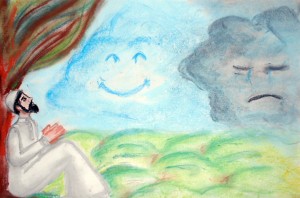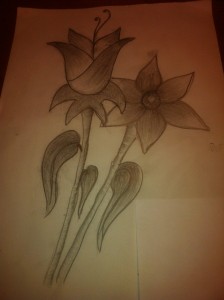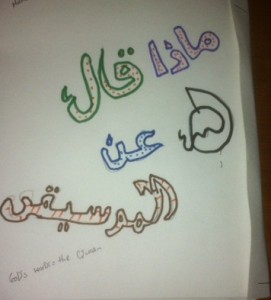Reflections!
Dear Mr. Pro-Vocative,
How are you? How is your religious journey going?
I’m writing about areligion class that I joined this semester. My ideas about Islam were really challenged in that class.I came to this class thinking that Islam was monolithic and that there is one Islamic law. I mean… I understood that there could be many interpretations and much ijtihad in Islam, but I never thought there could be that much diversity in a religion that seemed so mono-colored. Last August, I was Angry with Islam – all the violence, forced marriages, compulsory veiling and those unbearably loud Friday prayers- , but having taken the time to read, write, reflect, ask questions, memorize poetry and even paint… I feel I’m at peace with Islam. I encountered Many Muslims and Muslim writers who came from entirely different religious traditions, and I was simultaneously fascinated and shocked at the amount of interfaith engagement that was involved.One of my favorite lines was when my professor said that if you give different people the same book and give each one a highlighter, each would highlight different parts; parts they could identify with. Islam no longer seems like one thing
I come from Egypt – a predominantly Sunni place. Growing up, I was exposed to the various stereotypes about Shi’s: that they believe that Ali was supposed to be the prophet, and that Gabriel mistakenly came to the prophet. Most Egyptians believed that Shi’s pray differently by putting a stone in front of them while praying. They think Abu Bakr and Omar are infidels and that they deny some of the prophet’s sayings and attribute it to Ali.They hate Aisha and to top it all,are insane enough tohit themselves and beat their sons with swords. On the day of Karbala, they are permitted to kill any non-Shi’a Muslim. They read heretical booksand the basis for their creed is unjustifiable. In a nutshell:Egyptians are shia-phobic. This phobia was so intense that one of my neighbors had told me that it is better to become friends with a kafir (a non-Muslim)than with a Shi’a.
When I started reading about Shism, I was fascinated at how similar Sunnis and Shias were. Everyone believed in the same God and the same prophet… the differences seemed trivial but I knew that these small differencescould stop so many SunniMuslims from getting married to Shi’a women and it was often the case that Sunnis would even be scared to visit a Shi’a house. All the readings and lectures on Shism made me feel like I had to actually experience this first-hand.And so, armed with my newly-formed understanding of the Shi’a creed, I travelled to Fresno, Californiaover my spring break. I stayed over a shii friend’s house partly because I wanted to watch him pray andalso because I had a huge amount of questions about how he approached religion. He organized a party to welcome me and invited all his very strong shii friends. I was blown away by their hospitality and their similarity to the Sunnis I grew up with. It was a moment of realization whenI felt like I was, quite literally, in Egypt. But along with the wonder and familiarity came sadness mixed with inspiration as I met with a young man who told me the story of how he fell in love with a Sunni woman and how her family rejected his proposal just because he followed a different form of Islam. He told me that he also had doubts about getting married to a Sunni women and was confused on whether the prophet would get mad or upset if he did this. He was very earnestly sad that I wanted to express this idea in poetry and that was how I wrote a poem onthe struggles Sunnis have when they fall in love with someone who follows a different form of Islam (in this case Shism), and howeven the smallest of differences can cause so much confusion.
Interested as I was, I asked so many questions that one of the leaders in the shi’I mosque I was invited to gave me a poster that said “la fatanelaaliwalasayfellazuo al fakar” . It was with excitement that I hung the poster on my dorm wall when I came back but when I was Skyping my mom she was furious at my hanging this poster. She reiterated that shi’s are wrong but then I start to tell her all about shism and told her that I was questioning my own faith and where I stand in this. It was through this conversation that my play,Kyaro Land,came to be.Theheroine,Nearaj, who really questioned her faith grew up believing in Kyaro and Petaloine (imaginary Gods), but she learns new languages and is suddenly introduced to all these new gods and she feels as though she knows nothing. She doubts God’s existence and just like in Iqbal’s poetry is constantly complaining to god about what her people are doing and where she stands. Nearaj finds it impossible to deal with all of this questioning and eventually kills herself. In her suicide note , she explains how important it is to question religion (and different forms within it), and how essential it is to find new ways to understand religion. The experience of Nearaj was somehow similar to my experience coming to America and learning English and reading about religion,particularly when I joined this class and saw the Asian paintings of the prophet, the congregational prayers led by women andthe movie on Iranian women and hijab. It was all really hard at times, and that is when I felt that I had to write this play.
My favorite part of this journey came later when I started learning about Sufism. I felt that this was what I was looking for. Sufism has always been attacked in Egypt… and it was amazing for me to sit on top of the science center and just listen to Sufi poetry: ilburda, IbnFarid’s, al-romy’s poetry… At the beginning, it all didn’t make sense. Why would they use words like wine, intoxication? Then I talked to my favorite professors back home and realized that many of my favorite people back home were Sufis. I then started to take it seriously and I actually would sit on my own and listen to their poetry and signing. Part of me, however,always questioned the legitimacy of using music and whether it is prohibited (as my parents once have told me) in Islam or not? That was how my book Idea came to be. The title of the book was “what did the Quran say about Music?” andupon opening it, we find nothing. I spent an entire month reading a chapter from the Quran every day in March, and the Quran sounded and felt different, and there was nothing there that was against Sufism. I began to feel that that Salafis’ and Egyyptians’ understating of Sufis was wrong. They didn’t even try to understand who those wonderful people were. I then decided that I would try memorizing a Sufi poem and that I would actually try and understand it and work with it as a project for myself rather than it being just a project for my class.
I sat in my room for hours listening to it being sung from many Sufis who were literally crying. It took me two days to memorize the poem, but I couldn’t think of anything else but the poetry for the next two weeks. I wondered what does it mean for a heart to be motlafi… and when I slept I dreamt of Ibnilfarid talking to me about his personal experience writing the poem. I changed my music playlist to Sufi poetry and music, andfelt great about it. I wanted at this time to actually go to a mosque and pray… I started reading MohiaKahf’spoem called My Little Mosque. The mosque was the exact opposite of the mosque that my house in Egypt overlooks. And I couldn’t help but try to visualize how a mosque with music, cigarettes, and a sign that says “Bad Muslims are welcome” would be like and that inspired my painting of her poem.
I was not particularly affected by this project, but I was moved by the idea of creating a mosque that truly accepts everyone and I started thinking of Harvard’s Islamic Society. The society was a practical example of everything I learned in the class…. Drastically different people with really different backgrounds coming to share their belief – or disbelief- in God without any criticism and with a mind open enough to not only grasp but also respect the differences. One of my main goals now is to take a class on Sufism. I feel that I still do not understand sufism – or “the mystical dimension of Islam”. I understand that sufishave been, and still are, attacked from Salafis and even some moderates, but I do not see sufism as esoteric. Sufis transcend conflicts and divisions. My goal for the summer is to read Mawlana Jalal and Rumi’sMathnawi.
Can I actually have a directand personal experience with God? I do not know. But one of the things I really believe in now is that there really is a Tariqah and a Shariahto what I do in life, and if I were to approach religion again, I would not only consider the Zahir, but would always think about the Batin and the internal, spiritual aspects of every action. I also feel okay with questioning religion. When the professor talked about Moses’ story when he came to god and asked his lord to speak to him directly and said “MyLord, show Yourself to me: let me see You.” I felt that this is precisely what every Sufi asks – reassurance and a direct experience with God and I really respect and appreciate that.
For three months, I was really provoked, informed, confused, upset, satisfiedand certainly challenged. I started the class as an agnostic and I ended it as a “reverent agnostic”. I am not at all angry with religion and yesterday when I was flying back home, I felt that I could not wait to meet with all my family members and be able to finally comprehend that my unveiled aunt, my Sufi uncle, my totally covered neighbor, my “moderate” mom, my Muslim-Brotherhood-affiliated best friend and my questioning self all make sense – and that each one of ussimply highlighted and underlined different parts of the Quran.
I wonder how much my highlighted version will change,
Thanks for listening,
Nourhan




